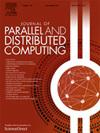在边缘云计算平台上实现高效程序执行
IF 3.4
3区 计算机科学
Q1 COMPUTER SCIENCE, THEORY & METHODS
引用次数: 0
摘要
本文研究了专用于边缘云基础设施性能的技术,并确定了要解决的挑战,以最大限度地提高其效率。与传统的纯云处理不同,边缘云平台通过靠近数据源的额外计算资源来满足实时应用的严格要求。然而,由于众多的性能因素,在这样的平台上执行高效的计算是一项复杂的任务。因此,我们确定了传统方法引起的主要性能瓶颈,并广泛讨论了边缘计算平台的性能特征。基于这些见解,我们设计了一个能够实现端到端边缘云应用程序效率的自动化框架。我们认为,在边缘云基础设施上实现性能需要根据计算需求自适应卸载程序。因此,我们全面研究了形成应用程序性能工作流的三个性能关键方面:i)性能建模,ii)程序优化,iii)任务调度。首先,我们探索性能建模技术,形成了大多数成本模型的基础,以准确预测和实现鲁棒的代码优化和调度。然后我们涵盖了整个程序优化链,从热点检测到代码优化,重点是内存局部性,代码并行化和加速。最后,我们讨论了选择最佳计算资源和确保平衡工作负载分配的任务调度技术。总体而言,我们的研究通过涵盖上述性能工作流程提供了见解,这些工作流程参考了突出的最先进的作品,特别关注那些尚未在边缘云计算环境中应用的作品。此外,我们还进行了实验来进一步验证我们的发现。最后,对于每个感兴趣的主题,我们确定了已解决的科学障碍,并概述了尚未克服的开放研究挑战。本文章由计算机程序翻译,如有差异,请以英文原文为准。
Towards efficient program execution on edge-cloud computing platforms
This paper investigates techniques dedicated to the performance of edge-cloud infrastructures and identifies the challenges to address to maximize their efficiency. Unlike traditional cloud-only processing, edge-cloud platforms meet the stringent requirements of real-time applications via additional computing resources close to the data source. Yet, due to numerous performance factors, it is a complex task to perform efficient computations on such platforms. Thus, we identify the main performance bottlenecks induced by traditional approaches and extensively discuss the performance characteristics of edge computing platforms. Based on these insights, we design an automated framework capable of achieving end-to-end efficacy of edge-cloud applications. We argue that achieving performance on edge-cloud infrastructures requires adaptive offloading of programs based on computational requirements. Thus, we comprehensively study three performance-critical aspects forming the performance workflow of applications: i) performance modelling, ii) program optimization iii) task scheduling. First, we explore performance modelling techniques, forming the foundation of most cost models, to accurately predict and achieve robust code optimization and scheduling. We then cover the whole program optimization chain, from hotspot detection to code optimization, focusing on memory locality, code parallelization, and acceleration. Finally, we discuss task scheduling techniques for selecting the best computing resource and ensuring a balanced workload distribution. Overall, our study provides insights by covering the above performance workflow referencing prominent state-of-the-art works, particularly focusing on those not yet applied in the context of edge-cloud computing. Additionally, we conducted experiments to further validate our findings. Finally, for each topic of interest, we identify the addressed scientific obstacles and outline the open research challenges yet to be overcome.
求助全文
通过发布文献求助,成功后即可免费获取论文全文。
去求助
来源期刊

Journal of Parallel and Distributed Computing
工程技术-计算机:理论方法
CiteScore
10.30
自引率
2.60%
发文量
172
审稿时长
12 months
期刊介绍:
This international journal is directed to researchers, engineers, educators, managers, programmers, and users of computers who have particular interests in parallel processing and/or distributed computing.
The Journal of Parallel and Distributed Computing publishes original research papers and timely review articles on the theory, design, evaluation, and use of parallel and/or distributed computing systems. The journal also features special issues on these topics; again covering the full range from the design to the use of our targeted systems.
 求助内容:
求助内容: 应助结果提醒方式:
应助结果提醒方式:


